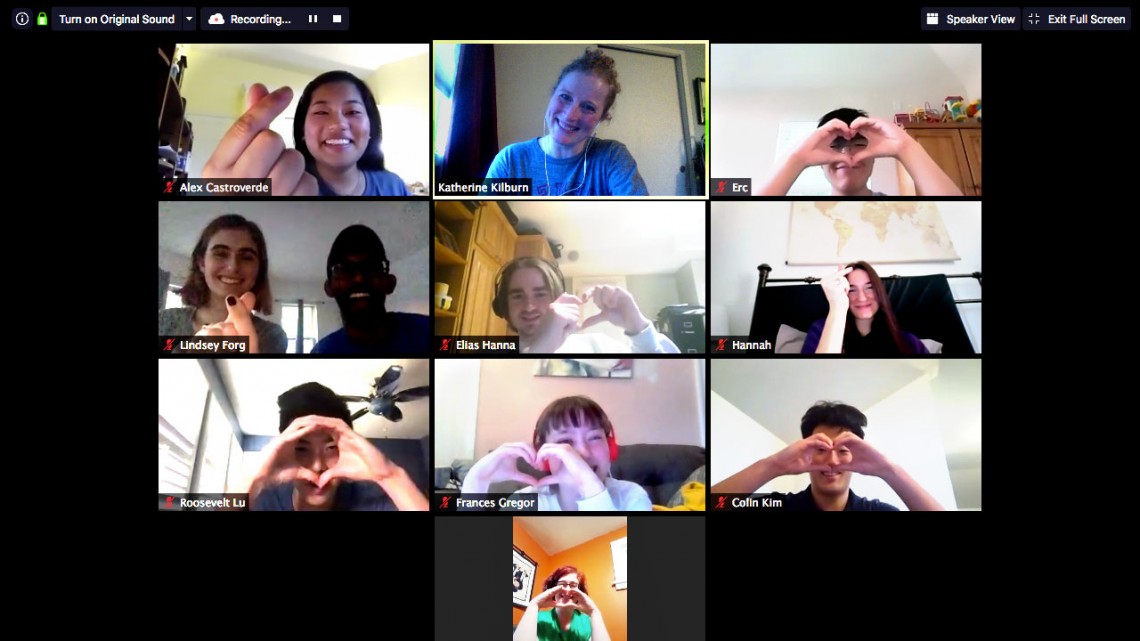
Katherine Kilburn, top center, Cornell’s interim director of orchestras, leads a Zoom meeting with student mentors.
Orchestra students mentor young musicians remotely
By Kathy Hovis
Despite the restrictions placed on faculty, staff and students due to the COVID-19 pandemic, 10 members of the Cornell Orchestra are still meeting weekly by Zoom with their mentees – orchestra students from Cayuga Heights Elementary School in Ithaca.
“The mentors have motivated and challenged my children in their playing,” said parent Gretchen Ryan ’97, whose sons Gabriel and Luka have mentors through the program. “They have [helped the boys] through tough spots in songs and supported them when they are frustrated or think they can’t do something.”
Working to expand music department contributions to the community beyond performances, Cornell Concert Series manager Deborah Justice had been laying the groundwork to transition the program – which has been going on informally for three years – into a credit-bearing course.
The pieces fell into place when Katherine Kilburn, Cornell’s interim director of orchestras, joined the faculty last fall. The two women worked together to put plans into action.
Along with their virtual visits with kids, the Cornell students also met biweekly with professional musicians and teachers from the area — including Andi Merrill, founder and director of Opus Ithaca, and Sarah Cummings of Ithaca Talent Education and the Cayuga Chamber Orchestra — who shared insights about working with young musicians.
Before the shift to remote learning, the Cornell mentors met with their young students either weekly or every other week in on-campus practice rooms.
“We are just a group of students who love what music has brought us, and we want to help our mentees have the same experience,” said mentor Hannah Faulwell ’22, an urban studies major who plays the violin. “A little bit of individual attention goes a long way, especially when the goal of that attention is purely to inspire. We want to help our mentees understand that their time spent practicing, which they may not always be excited about, is setting them on a path to be a lifelong musician, like we are, and that being a lifelong musician is something worth practicing for.”
So many elementary school students were interested that some orchestra members took on more than one mentee. Now that most Cornell students are living back home and public school kids are also learning from home, their meetings have moved online.
“Some students are dealing with challenging situations, including one elementary student who couldn’t bring her instrument home to Italy because it was a school instrument,” Kilburn said. “So her mentor is working with her on melody, rhythm, harmony. The mentors are being very creative about how they’re continuing to strengthen their mentees’ musical skills and support and inspire them.”
Kirkland Sugrim ’21 has been involved in the mentoring program since his freshman year and he’s watched one of his mentees, sixth-grader Jack Pieretti, grow over four years.
“We both love to problem-solve, to take on really difficult challenges and do things that no one else is doing,” Sugrim said about his mentee. “I’m working with him the way my teachers worked with me.”
Read the full version of this story on the Arts and Sciences website.
Kathy Hovis is a writer for the College of Arts and Sciences.
Media Contact
Get Cornell news delivered right to your inbox.
Subscribe
